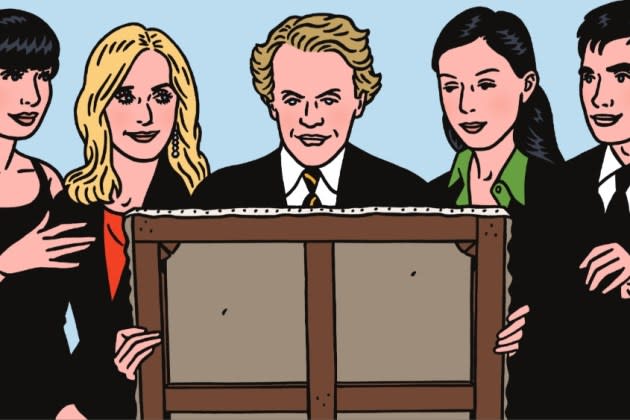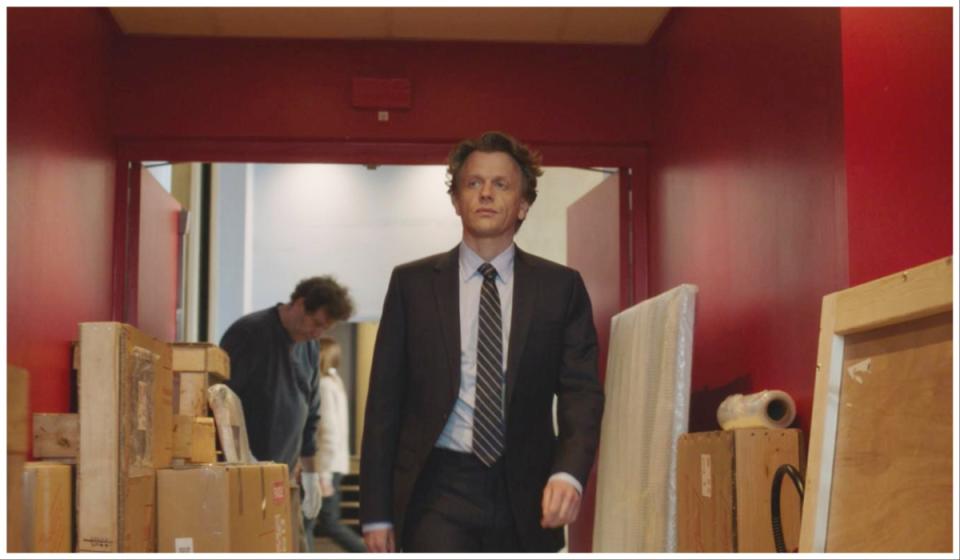Pascal Bonitzer Takes Art World Inspiration for ‘Auction,’ Charts New Course for Georges Simenon’s Maigret (EXCLUSIVE)
- Oops!Something went wrong.Please try again later.
- Oops!Something went wrong.Please try again later.

This week’s Unifrance Rendez-Vous in Paris will kick off with the Tuesday night world premiere of Pascal Bonitzer’s “Auction” – a ripped-from-the-headlines ensemble drama set in the crosshairs of high art and high finance.
Produced by SBS Productions (“Last Summer,” “Elle”) and sold by Pyramide International, the art-world saga follows – among others – a hotshot auctioneer (Alex Lutz, “Vortex”), his less-than-reliable assistant (Louise Chevillotte, “Benedetta”), and the working class bloke (Arcadi Radeff, “Passages”) who sets the narrative in motion upon realizing that his erstwhile innocuous wall art bears the signature of Egon Schiele.
More from Variety
Writer-director Pascal Bonitzer originally thought to explore this world of high-verve auctioneers as a series, but keyed into the story’s singular, cinematic potential thanks to the real-life discovery of Schiele masterworks thought lost during World War II.
“I was fascinated by this collision of two worlds,” Bonitzer tells Variety. “On the one hand, these auctioneers need to play a game – they must seduce potential sellers, wresting artifacts from the competition [with a show of confidence]. And then you have this young factory worker who owns a valuable work of art without knowing. So I was interested in this contrast, which plunges the young man into a world that’s completely foreign to him – the world of money.”

A dexterous screenwriter, Bonitzer draws parallels between the cosmopolitan wheeler-dealer André (Alex Lutz) and his shell-shocked client, all while building out a lively cast of characters that also includes André’s art-appraiser colleague and ex-wife (Léa Drucker, “Last Summer”) and the provincial lawyer doing all that she can to bridge these two worlds (Nora Hamzawi, “Non-Fiction”).
And then, cutting through the character drama, is André’s pathological liar intern, Aurore (Louise Chevillotte).
“I needed a point of entry into this rather opaque world,” Bonitzer explains. “But at the same time, I needed to somehow make that character special, to make her stand out. And this idea of a destabilizing liar really amused me.”
Why’s that?
“Lies are fundamentally cinematic,” says Bonitzer. “An onscreen lie creates tension, and distance between the characters and the viewer. The viewer becomes a witness to something the characters don’t know, which becomes a source of friction and source of pleasure as we wait for the truth to be discovered, for the characters to catch up.”
A former Cahiers du Cinéma critic turned filmmaker, Bonitzer remains a sought-after collaborator within the French industry. He recently co-wrote “Last Summer” with Catherine Breillat and will next adapt Georges Simenon’s “Maigret in Society,” which he plans to direct.
First published in 1960, “Maigret in Society” (also released as “Maigret and the Old People”) was one of Simenon’s later and more reflective volumes, finding the acclaimed detective pouring over a correspondence that dates back 50 years. Critics and scholars have often considered the book one of Simenon’s best.
“It concerns me in a way, because I’m not so young anymore,” laughs Bonitzer.
Though Simenon’s barrel-chested commissaire was last brought to the screen by Gérard Depardieu in Patrice Leconte’s 2022 “Maigret,” Bonitzer has a different vision for the character and another artistic goal.
“It won’t be Depardieu,” says Bonitzer. “I’d like someone younger. I’d like to rejuvenate the character. I have an actor in mind, but I’m superstitious, so I won’t say more.”
Best of Variety
From 'Killers of the Flower Moon' to 'Eileen': The Best Book-to-Screen Adaptations to Read This Year
The Best 'Sopranos' Merch to Celebrate the Show's 25th Anniversary
Sign up for Variety’s Newsletter. For the latest news, follow us on Facebook, Twitter, and Instagram.

